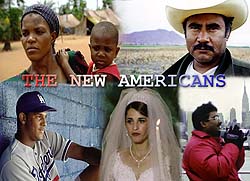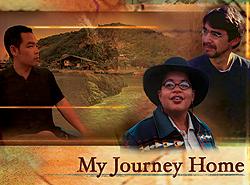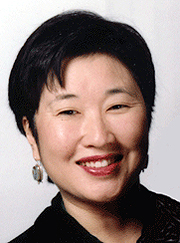|
March 22, 2004
Two new documentaries by award-winning UCSC filmmaker
will air in coming weeks
By Jennifer McNulty
Award-winning documentary filmmaker Renee
Tajima-Peña won’t be watching the Public Broadcasting
Service (PBS) premiere of her new
film later this month. She’ll be teaching a class in Social
Sciences 2 instead.

Renee Tajima-Peña says she takes pride in giving voice
to “faceless, voiceless” people who nevertheless have
rich, complex lives. She directed an episode of The New Americans,
above, focusing on immigant families. My Journey Home is
a documentary about four Americans who travel to their ancestral
homelands, below.

|
Tajima-Peña, an associate professor of community studies who
joined the UC Santa Cruz faculty last fall, directed an episode of The
New Americans, a documentary miniseries that traces the journeys
of America’s newest arrivals from their homelands through their
first years in the United States.
The scheduled broadcast on March 29-31 at 9 p.m. conflicts with Tajima-Peña’s
video production film class, which meets Wednesday evenings from 7 to
10 p.m. “It’s OK, though,” she said. “I’ll
catch the second half at home.”
Tajima-Peña’s film tells the story of Pedro Flores, a Mexican
immigrant who works as a meatpacker in rural Kansas to support his wife
and six children in rural Mexico, and the family’s tireless efforts
to be reunited in the “promised land.”
“Pedro Flores was in this country for 13 years, working different
jobs, and he’d go home to Mexico every year or two, but he wanted
to bring his family here legally,” said Tajima-Peña, who
followed Flores and his family through their immigration application
process and eventual relocation to the isolated and destitute farming
community of Mecca, California.
“They’re glad they’re together, but they had a whole
life in Mexico,” said Tajima-Peña. “Would they do it
again? I don’t know.”

Renee Tajima-Peña's next project is about a Vietnamese
orphan. |
By telling the stories of people like the Flores family, Tajima-Peña
and her colleagues on The New Americans hope to build greater
understanding for the plight of contemporary immigrants. Produced by
Independent Television Service (ITVS), the series will be followed this
spring by a companion book, and a web
site offers educational and community resources.
“For a family like the Floreses, they’d never be able to
tell their stories otherwise,” said Tajima-Peña, who takes
pride in giving voice to “faceless, voiceless” people who
nevertheless have rich, complex lives.
Her next project, My Journey Home, a two-hour documentary about
four Americans who travel to their ancestral homelands, will air Wednesday,
April 7, at 9 p.m. on PBS stations nationwide. The film presents the
stories of writer Faith Adiele, journalist Andrew Lam, and Tajima-Peña’s
husband and brother-in-law, Armando and Carlos Peña.
A leading documentary filmmaker whose first film, Who Killed Vincent
Chin?, was nominated for an Academy Award in 1988, Tajima-Peña
is in the enviable position of having producers approach her with funding
for projects.
“I had done a film called My America, which was a road
movie in which I went in search of Asian America,” recalled Tajima-Peña.
“I tried to be humorous, poignant--the whole thing. So PBS called
and asked me if I would do film about American diversity.” The
result is My Journey Home.
Never faced with a shortage of projects, Tajima-Peña is already
at work on her next documentary, a film about a Vietnamese orphan who
is reunited with her father and his new family in the United States
at the age of 12.
Despite her successful career as a filmmaker, Tajima-Peña jumped
at the opportunity to join the new social documentation program in the
Community Studies Department.
“I’d never taught before, because I was always busy making
films, but when I heard about this program, I couldn’t believe
it. There’s nothing like this anywhere else,” she said.
The program will train students to use social science methodologies
to analyze social problems and to capture people’s lives and culture
in visual, audio, or print media. “The focus on critical thinking
in a social science context is unique. They don’t do this in film
school, they don’t do it in journalism school, and they don’t
do it in communications programs,” said Tajima-Peña. “This
is an opportunity to train students to do what I do, which is make social
change documentaries.”
Tajima-Peña, 45, said teaching is like having a child at the
age of 40, which she also did. “I keep asking myself, why didn’t
I do this earlier? It’s so much fun!”
Return to Front Page
|